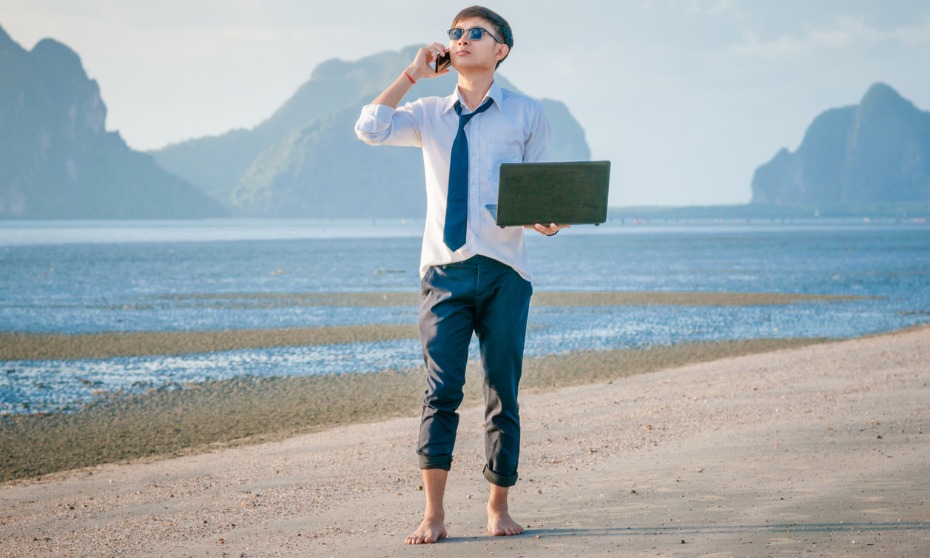
A leader's job is never-ending and for some, it cuts into down-time as well, intentionally or otherwise.

A recent study by Michael Page found that seven in 10 professionals at all job levels take work calls and emails outside of office hours.
And in the era of globalisation and multi-country responsibilities, more than eight in 10 continue to stay online after hours, as they feel they have responsibilities that ‘require them to be contactable’.
It doesn’t just stop at ‘after hours’ – seven in 10 professionals struggle to disconnect while on holiday, according to Snow Software. The study found that most (71%) have a bad habit of bringing their work-issued devices on vacation.
What’s worse, another study found that over half of professionals feel guilty about ‘indulging’ in leisure time. Sentosa Development Corporation (SDC) found that half of professionals were stressed by the thought of doing nothing, with three in 10 reporting that they frankly don’t know how to relax.
Despite all this, 74% of those surveyed wished they could be present and spend more time with their families and loved ones.
Why ‘always on’ culture is bad for leaders
All the studies typically come to a similar conclusion: ‘always on’ culture isn’t just bad for personal well-being, it also cuts into precious time spent with loved ones, and eventually professional performance.
Everything could become too much for one person to handle – pressures from work and increased demand for time from home – that it could easily lead to burnout.
And as a leader, it could be worse, as your team members continue to look to you for direction, regardless of your currently overflowing plate.
READ MORE: How to combat ‘leadership burnout’
Mental wellness advocate, Singapore’s nominated member of parliament (NMP), and former CEO Anthea Indira Ong told HRD that she believes the problem with leadership burnout starts with the skewed view that leaders are ‘superhumans’ who are the fixer-uppers and problem-solvers of the organisation.
Because of that, she said that leaders – possibly even more than the average employee – should be more self-aware and in tune with their well-being to avoid falling into a spiral.
This, she shared from her experience with a close shave with depression 12 years ago, when she was a CEO of a high-flying business.
“My philosophy is I’m very, very human,” she said. “I’m first a full-time human being and part-time everything else… that means I’m not a machine, and therefore I definitely need that pause, that grasp.”
What she advocates is not just short holiday breaks. She suggested a holistic, consistent practice to keep yourself in the right frame of mind.
“[Holiday breaks are] important – that’s one part of it,” she said. “[But it’s also] about that discipline of regular practice, of self-care. It doesn't matter what that is – all of us have different self-care practices.”
Tips to overcome ‘always on’ culture
To help keep professionals even more in check while on vacation, the team at Expedia has put together practical tips, so that you don’t have to become yet another statistic.
1. Accept that there is no ‘perfect’ work-leisure balance
In today’s world, companies are operating with an increasingly lean workforce, with technology serving as the common fabric that keeps us connected despite the distance created by time and space.
With the always-on lifestyle making it challenging for professionals to separate work from leisure, it will do you good to simply accept the fact that there is no ‘perfect’ work-leisure balance.
Strive, instead, for a ‘realistic’ work-leisure balance, by taking your role and responsibilities at work and at home into account, in order to strike a sustainable rhythm that keeps you productive at work without burning out in the longer term.
READ MORE: How to attain an authentic ‘work-life balance’
2. Plan your vacation AND handover early
As with all things, planning early always helps. Planning your vacation months in advance also gives you ample time to work out handover arrangements at work with your colleagues, while giving your other key contacts time to consider the possible gaps to fill up before you take off to your holiday destination.
3. Set clear goals and priorities
Unless you’re completely in control of your work schedule, vacation opportunities usually come only once in a blue moon.
Hence even when there is a good reason for you to stay connected to work on holiday, it’s important to set clear goals and priorities to prevent work from encroaching too far into your vacation time.
Ask yourself these questions:
Once done, prioritise the tasks that require your urgent attention and deprioritise the rest till after your holiday.
4. Don’t be afraid to unplug
In our hyperconnected world, there’s never a moment when you can completely disconnect from unless you make it a point to do so.
Consider the upsides of unplugging from the world: disconnecting from your digital devices can allow you ample time to recover from work-related stress while giving you the space to refresh and recharge yourself.
Unplugging can simply mean:
READ MORE: Singaporeans blame ‘toxic’ colleagues for work-life imbalance
5. Set boundaries and communicate them clearly
If connecting to work is inevitable while on vacation, it’s worth your while to set boundaries for your availability timings and communicate this clearly to your co-workers and key contacts so that they know when to reach you for urgent work matters.
Additionally, it helps to explain the reasons for being inaccessible during the set hours, because you are engaged in personal activities and may not have access to your laptop or connectivity.
This will help to ensure that they understand and respect your work limits and expectations while helping you to have a good vacation at the same time.